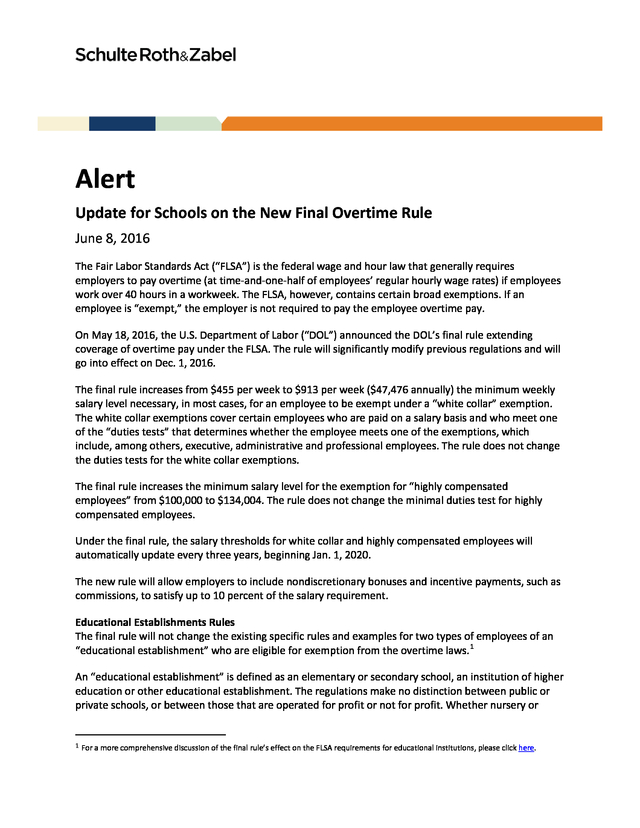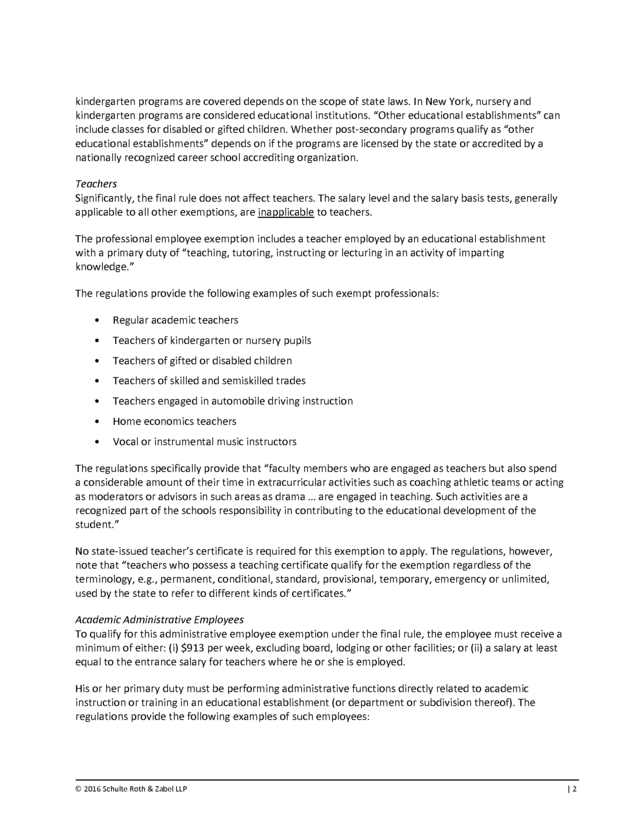Description
Alert
Update for Schools on the New Final Overtime Rule
June 8, 2016
The Fair Labor Standards Act (“FLSA”) is the federal wage and hour law that generally requires
employers to pay overtime (at time-and-one-half of employees’ regular hourly wage rates) if employees
work over 40 hours in a workweek. The FLSA, however, contains certain broad exemptions. If an
employee is “exempt,” the employer is not required to pay the employee overtime pay.
On May 18, 2016, the U.S. Department of Labor (“DOL”) announced the DOL’s final rule extending
coverage of overtime pay under the FLSA.
The rule will significantly modify previous regulations and will go into effect on Dec. 1, 2016. The final rule increases from $455 per week to $913 per week ($47,476 annually) the minimum weekly salary level necessary, in most cases, for an employee to be exempt under a “white collar” exemption. The white collar exemptions cover certain employees who are paid on a salary basis and who meet one of the “duties tests” that determines whether the employee meets one of the exemptions, which include, among others, executive, administrative and professional employees. The rule does not change the duties tests for the white collar exemptions. The final rule increases the minimum salary level for the exemption for “highly compensated employees” from $100,000 to $134,004.
The rule does not change the minimal duties test for highly compensated employees. Under the final rule, the salary thresholds for white collar and highly compensated employees will automatically update every three years, beginning Jan. 1, 2020. The new rule will allow employers to include nondiscretionary bonuses and incentive payments, such as commissions, to satisfy up to 10 percent of the salary requirement. Educational Establishments Rules The final rule will not change the existing specific rules and examples for two types of employees of an “educational establishment” who are eligible for exemption from the overtime laws. 1 An “educational establishment” is defined as an elementary or secondary school, an institution of higher education or other educational establishment.
The regulations make no distinction between public or private schools, or between those that are operated for profit or not for profit. Whether nursery or 1 For a more comprehensive discussion of the final rule’s effect on the FLSA requirements for educational institutions, please click here. . kindergarten programs are covered depends on the scope of state laws. In New York, nursery and kindergarten programs are considered educational institutions. “Other educational establishments” can include classes for disabled or gifted children. Whether post-secondary programs qualify as “other educational establishments” depends on if the programs are licensed by the state or accredited by a nationally recognized career school accrediting organization. Teachers Significantly, the final rule does not affect teachers.
The salary level and the salary basis tests, generally applicable to all other exemptions, are inapplicable to teachers. The professional employee exemption includes a teacher employed by an educational establishment with a primary duty of “teaching, tutoring, instructing or lecturing in an activity of imparting knowledge.” The regulations provide the following examples of such exempt professionals: • Regular academic teachers • Teachers of kindergarten or nursery pupils • Teachers of gifted or disabled children • Teachers of skilled and semiskilled trades • Teachers engaged in automobile driving instruction • Home economics teachers • Vocal or instrumental music instructors The regulations specifically provide that “faculty members who are engaged as teachers but also spend a considerable amount of their time in extracurricular activities such as coaching athletic teams or acting as moderators or advisors in such areas as drama … are engaged in teaching. Such activities are a recognized part of the schools responsibility in contributing to the educational development of the student.” No state-issued teacher’s certificate is required for this exemption to apply. The regulations, however, note that “teachers who possess a teaching certificate qualify for the exemption regardless of the terminology, e.g., permanent, conditional, standard, provisional, temporary, emergency or unlimited, used by the state to refer to different kinds of certificates.” Academic Administrative Employees To qualify for this administrative employee exemption under the final rule, the employee must receive a minimum of either: (i) $913 per week, excluding board, lodging or other facilities; or (ii) a salary at least equal to the entrance salary for teachers where he or she is employed. His or her primary duty must be performing administrative functions directly related to academic instruction or training in an educational establishment (or department or subdivision thereof).
The regulations provide the following examples of such employees: © 2016 Schulte Roth & Zabel LLP |2 . • Head of a school, i.e., superintendent principal, etc., and any assistants “responsible for administration of such matters as curriculum . . . and other aspects of the teaching program” • Department heads in institutions of higher education, i.e., Dean of the Mathematics Department • Academic counselors “who perform work such as administering school testing programs, assisting students with academic problems and advising students concerning degree requirements” Specifically excluded from the special academic administrative employee test are jobs relating to such things as building management, health of students, psychologists, and lunch room managers.
Such jobs, however, may be exempt under the FLSA white collar exemptions previously discussed. Authored by Mark E. Brossman, Scott A. Gold, Donna Lazarus and Ann Margius. If you have any questions concerning this Alert, please contact your attorney at Schulte Roth & Zabel or one of the authors. For more information on these changes generally, plus changes to New York’s minimum wage laws and exempt employee salary thresholds, please see our May 27, 2016 Alert. This information has been prepared by Schulte Roth & Zabel LLP (“SRZ”) for general informational purposes only.
It does not constitute legal advice, and is presented without any representation or warranty as to its accuracy, completeness or timeliness. Transmission or receipt of this information does not create an attorney-client relationship with SRZ. Electronic mail or other communications with SRZ cannot be guaranteed to be confidential and will not (without SRZ agreement) create an attorney-client relationship with SRZ.
Parties seeking advice should consult with legal counsel familiar with their particular circumstances. The contents of these materials may constitute attorney advertising under the regulations of various jurisdictions. © 2016 Schulte Roth & Zabel LLP |3 .
The rule will significantly modify previous regulations and will go into effect on Dec. 1, 2016. The final rule increases from $455 per week to $913 per week ($47,476 annually) the minimum weekly salary level necessary, in most cases, for an employee to be exempt under a “white collar” exemption. The white collar exemptions cover certain employees who are paid on a salary basis and who meet one of the “duties tests” that determines whether the employee meets one of the exemptions, which include, among others, executive, administrative and professional employees. The rule does not change the duties tests for the white collar exemptions. The final rule increases the minimum salary level for the exemption for “highly compensated employees” from $100,000 to $134,004.
The rule does not change the minimal duties test for highly compensated employees. Under the final rule, the salary thresholds for white collar and highly compensated employees will automatically update every three years, beginning Jan. 1, 2020. The new rule will allow employers to include nondiscretionary bonuses and incentive payments, such as commissions, to satisfy up to 10 percent of the salary requirement. Educational Establishments Rules The final rule will not change the existing specific rules and examples for two types of employees of an “educational establishment” who are eligible for exemption from the overtime laws. 1 An “educational establishment” is defined as an elementary or secondary school, an institution of higher education or other educational establishment.
The regulations make no distinction between public or private schools, or between those that are operated for profit or not for profit. Whether nursery or 1 For a more comprehensive discussion of the final rule’s effect on the FLSA requirements for educational institutions, please click here. . kindergarten programs are covered depends on the scope of state laws. In New York, nursery and kindergarten programs are considered educational institutions. “Other educational establishments” can include classes for disabled or gifted children. Whether post-secondary programs qualify as “other educational establishments” depends on if the programs are licensed by the state or accredited by a nationally recognized career school accrediting organization. Teachers Significantly, the final rule does not affect teachers.
The salary level and the salary basis tests, generally applicable to all other exemptions, are inapplicable to teachers. The professional employee exemption includes a teacher employed by an educational establishment with a primary duty of “teaching, tutoring, instructing or lecturing in an activity of imparting knowledge.” The regulations provide the following examples of such exempt professionals: • Regular academic teachers • Teachers of kindergarten or nursery pupils • Teachers of gifted or disabled children • Teachers of skilled and semiskilled trades • Teachers engaged in automobile driving instruction • Home economics teachers • Vocal or instrumental music instructors The regulations specifically provide that “faculty members who are engaged as teachers but also spend a considerable amount of their time in extracurricular activities such as coaching athletic teams or acting as moderators or advisors in such areas as drama … are engaged in teaching. Such activities are a recognized part of the schools responsibility in contributing to the educational development of the student.” No state-issued teacher’s certificate is required for this exemption to apply. The regulations, however, note that “teachers who possess a teaching certificate qualify for the exemption regardless of the terminology, e.g., permanent, conditional, standard, provisional, temporary, emergency or unlimited, used by the state to refer to different kinds of certificates.” Academic Administrative Employees To qualify for this administrative employee exemption under the final rule, the employee must receive a minimum of either: (i) $913 per week, excluding board, lodging or other facilities; or (ii) a salary at least equal to the entrance salary for teachers where he or she is employed. His or her primary duty must be performing administrative functions directly related to academic instruction or training in an educational establishment (or department or subdivision thereof).
The regulations provide the following examples of such employees: © 2016 Schulte Roth & Zabel LLP |2 . • Head of a school, i.e., superintendent principal, etc., and any assistants “responsible for administration of such matters as curriculum . . . and other aspects of the teaching program” • Department heads in institutions of higher education, i.e., Dean of the Mathematics Department • Academic counselors “who perform work such as administering school testing programs, assisting students with academic problems and advising students concerning degree requirements” Specifically excluded from the special academic administrative employee test are jobs relating to such things as building management, health of students, psychologists, and lunch room managers.
Such jobs, however, may be exempt under the FLSA white collar exemptions previously discussed. Authored by Mark E. Brossman, Scott A. Gold, Donna Lazarus and Ann Margius. If you have any questions concerning this Alert, please contact your attorney at Schulte Roth & Zabel or one of the authors. For more information on these changes generally, plus changes to New York’s minimum wage laws and exempt employee salary thresholds, please see our May 27, 2016 Alert. This information has been prepared by Schulte Roth & Zabel LLP (“SRZ”) for general informational purposes only.
It does not constitute legal advice, and is presented without any representation or warranty as to its accuracy, completeness or timeliness. Transmission or receipt of this information does not create an attorney-client relationship with SRZ. Electronic mail or other communications with SRZ cannot be guaranteed to be confidential and will not (without SRZ agreement) create an attorney-client relationship with SRZ.
Parties seeking advice should consult with legal counsel familiar with their particular circumstances. The contents of these materials may constitute attorney advertising under the regulations of various jurisdictions. © 2016 Schulte Roth & Zabel LLP |3 .















